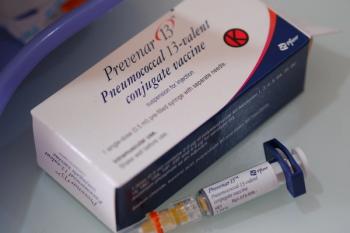
Pneumococcal Vaccine Rates Are Low Despite Updated Recommendations
Recent data highlight the importance of implementing strategies to improve vaccine uptake.
In 2022, the Advisory Committee on Immunization Practices (ACIP) published updated pneumococcal vaccine recommendations.1 The committee recommended that adults aged 65 and older who have not received a pneumococcal conjugate vaccine (PCV) or whose history is unknown receive a single dose of either the 20-valent PCV (PCV20) or the 15-valent PCV (PCV15) vaccine. Additionally, when PCV15 is used, a single dose of the 23-valent pneumococcal polysaccharide vaccine (PPSV23) should follow.
However, 21 months after the updated recommendations, fewer than 1 in 7 US adults had received a dose of the PCV20 vaccine, and uptake remained low among at-risk or high-risk adults and those without prior vaccination. The data, published in the journal AJPM Focus, highlight the importance of implementing strategies to improve vaccine uptake.2
“Observed low levels of pneumococcal vaccine uptake among eligible US adults persist despite major US public health goals focusing on increasing their use,” the authors wrote. “Increasing pneumococcal vaccine uptake is especially important in light of the recent COVID-19 pandemic that disrupted routine immunization services and highlighted the vulnerability of adults to respiratory infections.”
A team of investigators from Avalere Health and Pfizer conducted a study to assess uptake of pneumococcal vaccine recommendations and disparities in uptake across subgroups of adult patients. The retrospective cohort study gathered data from the Optum de-identified Clinformatics Data Mart Database from January 2015 through October 2023. The study also included data from adults aged 65 and older who were enrolled in the Medicare Advantage program.
The study cohort included 6.8 million adult patients who were enrolled in a health plan as of January 2022 that contributed data to the Optum database. Approximately 86% were 65 years or older, 56% were female, 38% were considered low risk, 39% were at risk, and 22% were high risk. Of those, 38% had evidence of pneumococcal vaccination prior to January 2022.
The study found that the uptake of pneumococcal vaccines 21 months after the updated recommendations was 13.2%, with the highest uptake during the first 6 months being the PPSV23 vaccine. By the end of the study period, the use of PCV20 was highest at 9.6%, followed by PPSV23 at 3%, PCV13 at 0.8%, and PCV15 at 0.2%. Uptake of the PCV20 vaccine was highest among adults aged 65 to 66 years and lowest among at-risk and high-risk adults between the ages of 19 to 49 years.
“While pneumococcal disease decreased during the [COVID-19] pandemic, the incidence has since resurged, and with it the potential for vaccination to improve health outcomes as well as reduce the economic burden on the health care system,” the authors concluded. “Accordingly, new and/or better uptake strategies involving educational campaigns, improving vaccine access and affordability, strengthening the provider recommendation, and integrating vaccination with other preventive services are needed.”
READ MORE:
Are you ready to elevate your pharmacy practice? Sign up today for our
References
1. Kobayashi M, Farrar JL, Gierke R, et al. Use of 15-valent pneumococcal conjugate vaccine and 20-valent pneumococcal conjugate vaccine among U.S. adults: updated recommendations of the Advisory Committee on Immunization Practices — United States, 2022. MMWR Morb Mortal Wkly Rep. 2022;71:109-117. doi:10.15585/mmwr.mm7104a1
2. Averin A, Vietri J, Mohs AA, et al. Uptake of pneumococcal vaccines among United States adults following 2022 update to recommendations. AJPM Focus. 2025;4(5):100384. https://doi.org/10.1016/j.focus.2025.100384
Newsletter
Pharmacy practice is always changing. Stay ahead of the curve with the Drug Topics newsletter and get the latest drug information, industry trends, and patient care tips.























